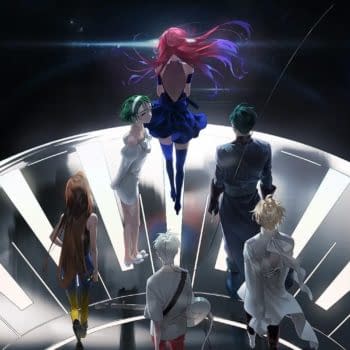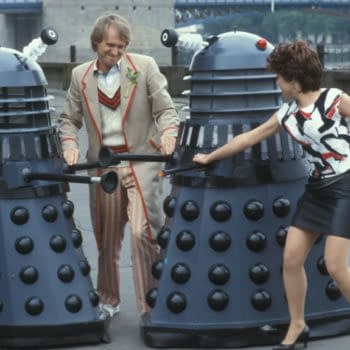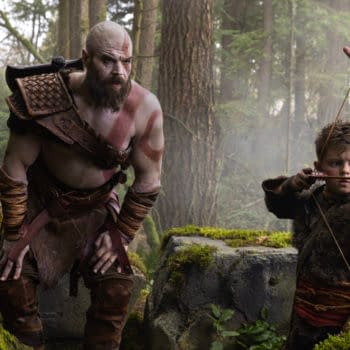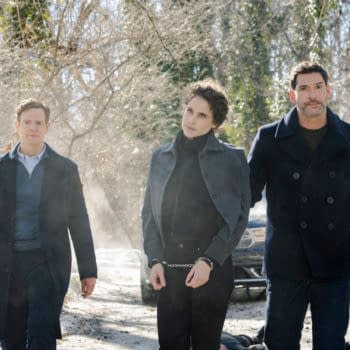Posted in: BBC, Doctor Who, TV | Tagged: bbc, david tennant, Derek jacobi, doctor who, grant, paul cornell, Richard E, russell t davies, Scream of the Shalka, Sophie Okenedo, steven moffat
Doctor Who: Let's Discuss Richard E. Grant's "Lost" Doctor in "Rogue"
In Doctor Who S01E06: "Rogue," Richard E. Grant was revealed as a "lost" Doctor. Could it be from the forgotten audio "Scream of the Shalka"?
This week's episode of Doctor Who, "Rogue," featured a surprise cameo that no one in their wildest dreams, not even the most hardcore fans, could have possibly expected: the appearance of Richard E. Grant as a "lost" or previously unknown Doctor. It happens when Rogue (Jonathan Groff) scans The Doctor (Ncuti Gatwa) and discovers all his previous faces. This included all the previous Doctors including the "lost" or "forgotten" incarnations: the War Doctor (John Hurt), the Fugitive Doctor (Jo Martin) and… another Doctor played by Richard E. Grant?? That seems to be the biggest controversy in the episode.
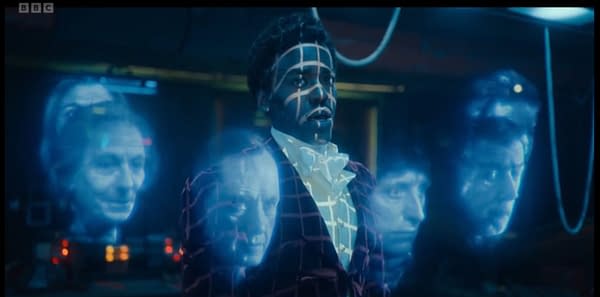
Richard E. Grant previously appeared in the series during Steven Moffat's run as showrunner, the first time playing a Scooge-like villain Dr. Simeon in Victorian London in the Christmas Special "Snowmen" then again in "The Name of the Doctor" as a classic series villain The Great Intelligence inhabiting the face and body of Dr. Simeon. He also played one regeneration of the Doctor in Moffat's first-ever BBC script for the 1999 Comic Relief special "The Curse of Fatal Death," which spoofed the series and is considered non-canon. When the Great Intelligence invaded the Doctor's history and tried to kill him in every timeline, did he become one of the Doctors? That might explain the "lost" 9th Doctor that Grant played in the 2003 audio drama/animated story "Scream of the Shalka."
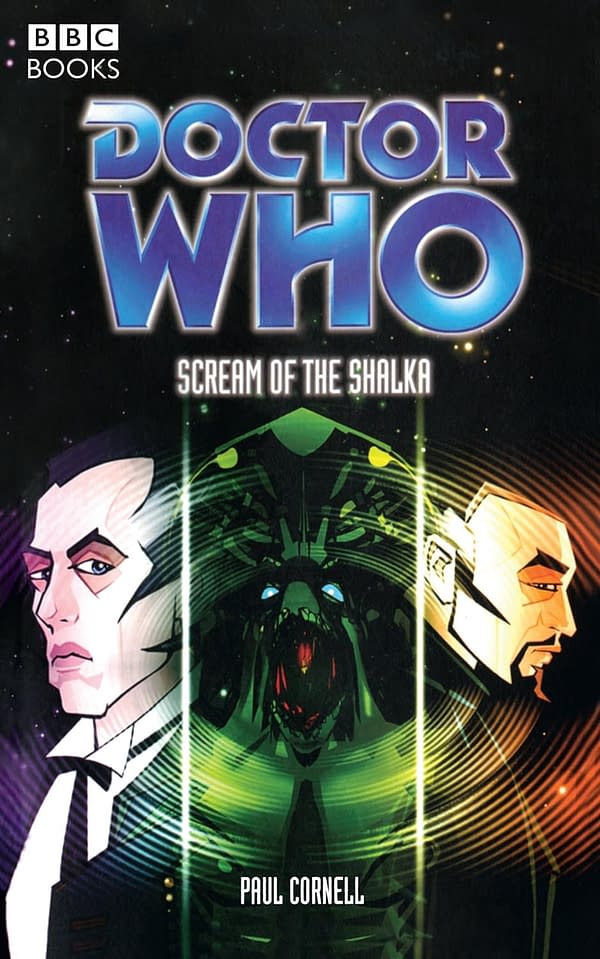
About Doctor Who: Scream of the Shalka
Doctor Who: Scream of the Shalka was intended to be a canonical web audio serialized on the BBC website in 2003 when the show was still cancelled. It was written by Paul Cornell, one of the most influential writers of the Virgin novels of the 1990s and who would go on to write major episodes of the 2005 revival of Doctor Who, including "Father's Day," "Human Nature" and "Family of Blood," the latter two an adaptation of his Virgin novel "Human Nature." He has written comics, including Action Comics for DC and his own original novels, but the work he did for the Virgin novels still influences Doctor Who to this day. Russell T. Davies did not like Grant's performance as the Doctor (he's not alone) and has said he was never in the running to be a future Doctor.
Paul Cornell's script for Scream of the Shalka is good, a kind of pilot or first standard episode introducing the new Doctor in a way that's similar to Davies' first episode, "Rose," two years later. The Doctor arrives and meets a young woman who brings out his emotions again, and she becomes his companion. The plot is a standard Doctor Who plot: aliens are laying siege to a town, and the Doctor must fight them. Cornell had written some backstory to set up this audio series' situation, and two more stories were planned, which were cancelled when the BBC decided to bring the series back to TV in 2004.
Unfortunately, the cheap Flash animation was terrible, and Richard E. Grant's performance was not good. He was overly shouty throughout the story and didn't add any nuance or feeling that he was reacting to anything the other actors in the same scene were saying. It might be the worst performance by a good actor in anything, let alone as the Doctor. His one-note performance failed to do justice to the many very good lines the Doctor was given in the script, including a speech at the end where The Doctor muses on his personal contradictions. It's a sign of an actor either getting no direction or refusing to take any. Davies told Doctor Who Magazine in 2004, "I thought he was terrible. I thought he took the money and ran, to be honest. It was a lazy performance. He was never on our list to play the Doctor." Grant, who has a place in many people's hearts for starring in Withnail & I, has since gone on to give excellent performances in many other films and even Loki.
The Continuing Influence of "Scream of the Shalka"
Paul Cornell's script had many similarities and ideas that have since ended up in the series, including a rehabilitated Master, now a companion but confined inside the TARDIS, and played by Derek Jacobi years before he played The Master in Doctor Who proper. The new companion was played by Sophie Okenedo, who went on to play the Queen of England in "The Beast Below," Steven Moffat's second episode as showrunner in 2010. Moffat would have Missy become a companion in his and Peter Capaldi's final season in 2017. And that uncredited young actor David Tennant with the bit part in it ended up becoming the Tenth Doctor in 2006. "Scream of the Shalka" producer James Goss is currently a producer at Big Finish Productions and one of their most prolific writers. Fun fact: Tennant was in a neighbouring studio working on another project when he heard they were recording "Scream of the Shalka," and came over asking them to give him a part, any part. He has an uncredited role as the caretaker of the warehouse.
Doctor Who: Scream of the Shalka was novelized by original author Paul Cornell and is available as an ebook now. It is also out on Audible and, thankfully, not read by Richard E. Grant. The audio drama production with the terrible animation is also available – if officially out of print – on DVD in US and UK editions if you want to subject yourself to it.





